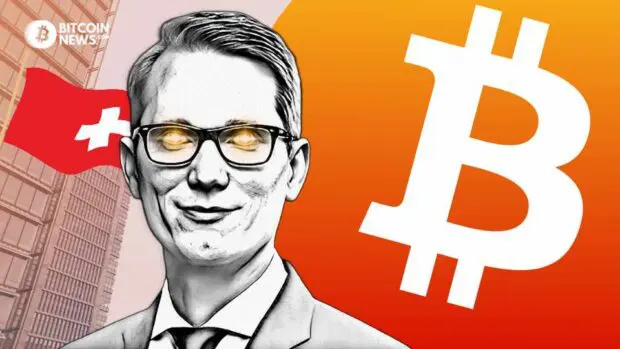Martin Schlege, Vice President of the Swiss National Bank (SNB), expressed his fascination about bitcoin during a recent television interview, saying it is “a very interesting concept.”
Schlege doesn’t go into detail but has a smile on his face. The interviewer asks Schlege to comment on the keyword “Bitcoin” and Schlege replies, “It’s a very interesting concept” not implying any further positive or negative notion.
Switzerland’s banking sector has encountered substantial difficulties in recent months, including the collapse of Credit Suisse, which was acquired by UBS under government oversight. The Swiss Financial Market Supervisory Authority (FINMA) attributed the failure of the country’s second-largest bank to Credit Suisse’s leadership.
In light of this, Swiss banks have started exploring the potential for growth in the bitcoin space. For example, PostFinance, which ranks fifth largest among Switzerland’s financial services companies, is partnering with Sygnum Bank to provide bitcoin services to more than 2.69 million customers.
With a global community of over 56 million holders, the bitcoin market has expanded significantly in recent years. Trading at around $28k on Friday, bitcoin’s impressive performance compared to traditional market equities has enticed institutional investors.
TradingView market data reveals that the price of bitcoin has surged by roughly 70 percent since the start of the year, while gold has gained around 9 percent, and the Dow Jones has only increased by 1 percent.
Consequently, publicly traded companies have been gradually adding bitcoin to their balance sheets. Coingecko’s market data reveals that publicly traded companies worldwide hold a total of 174,374 bitcoin.
The bulk of this share, valued at around $3.6 billion, is held by MicroStrategy Inc., which possesses approximately 140,000 bitcoin. Other notable holders include Coinbase Global and bitcoin mining firms such as Marathon Digital. Nevertheless, regulatory limitations seem to be preventing the global banking industry from investing in bitcoin.
At the Swiss National Bank’s annual general meeting in the previous year, Chairman Thomas Jordan expressed opposition to holding bitcoin as a reserve currency.
Jordan remarked that the bank has yet to be convinced that bitcoin meets the necessary requirements for such a purpose. However, he did state that purchasing bitcoin is feasible for the Bank, either directly or through investment products based on bitcoin.
Jordan added that the Bank could establish the necessary technical and operational requirements promptly if it concludes that holding bitcoin on its balance sheet is essential.
Bitcoin’s exchange rate has experienced a notable boost amid the ongoing global banking crisis, which originated with the collapse of three regional banks in the United States. Individual investors have increasingly moved away from the banking sector to bitcoin self-custody, resulting in the decentralized financial ecosystem being viewed as a national security risk by the U.S. federal government. It seems that banks are putting their fear aside, and have started looking into bitcoin to hedge themselves against the monopoly of the U.S. dollar.
Additionally, former President Donald Trump acknowledged that the U.S. dollar is gradually losing its standing as a global reserve currency. Top-league bankers like Martin Schlege are certainly among the ones who can shape a narrative and influence the overall decision-making in the sector.










